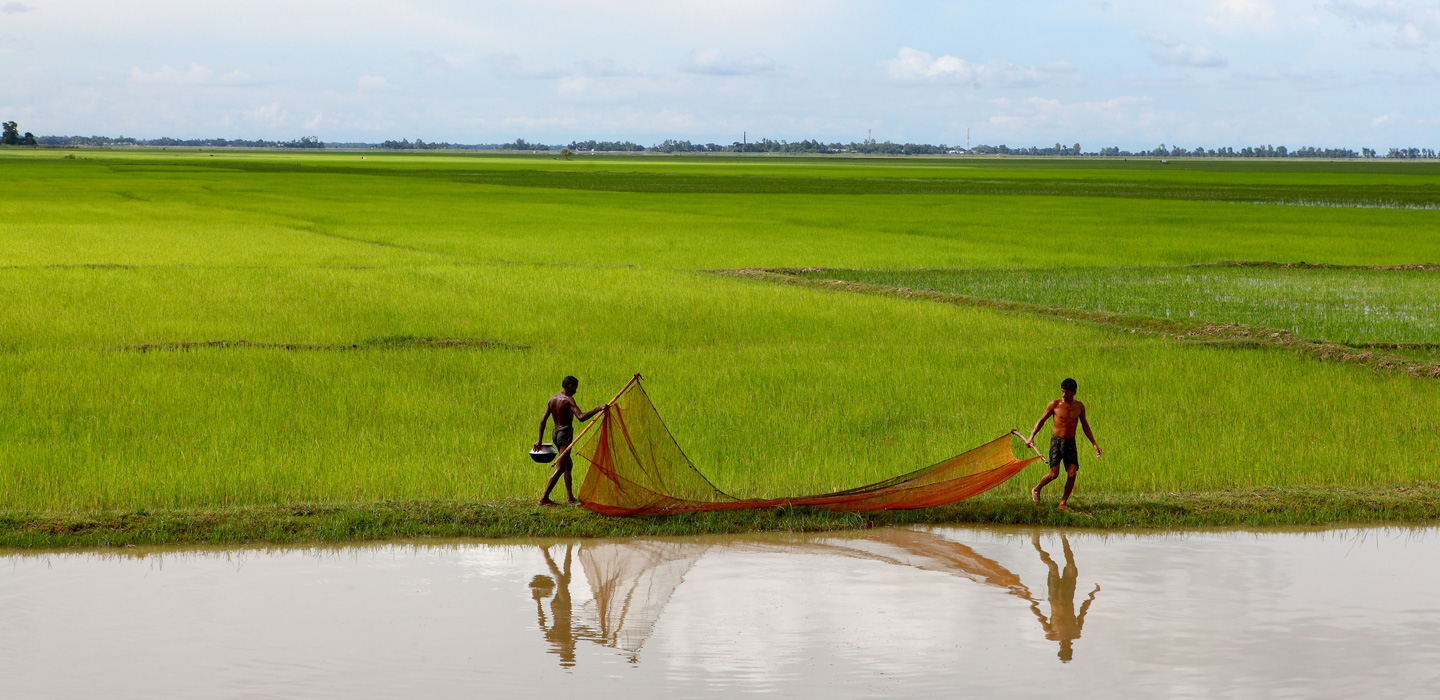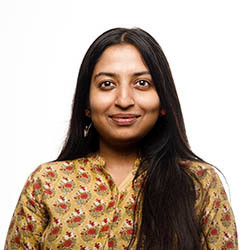At COP26, IFAD spotlights the impact of climate change on small-scale farmers with an innovative virtual visit to Bangladesh
IFAD Asset Request Portlet
ناشر الأصول
في COP 26 ، يسلط الصندوق الضوء على تأثير تغير المناخ على صغار المزارعين من خلال زيارة افتراضية مبتكرة إلى بنغلاديش
03 نوفمبر 2021
Rome/Glasgow, 3 November 2021 – The UN’s International Fund for Agricultural Development (IFAD) highlighted the impact of climate change on small-scale farmers at the 26th Conference of the Parties (COP26) to the UN Framework Convention on Climate Change currently underway in Glasgow, UK, through a virtual visit to Bangladesh, where the country’s poorest small-scale farmers spoke about the projects and practices that are helping them adapt.
Small-scale farmers, who produce 70-80 percent of Bangladesh’s food, are most vulnerable to the impacts of climate change – and, ironically, contribute to it the least. “Bangladesh contributes less than 0.47 percent of global emissions, yet it is one of the most climate-vulnerable countries in the world,” Prime Minister Sheikh Hasina said in her statement at the Leaders’ Meeting on Action and Solidarity–The Critical Decade at COP26. It is also a leader in climate action, offering several examples of how poor rural communities can adapt to the impacts of climate change, build resilience and restore livelihoods.
Accompanied by documentary filmmaker Qasa Alom, the audience virtually met and interacted with farmers participating in IFAD-supported projects, to discuss their climate challenges and how they and their rural communities are adapting.
IFAD’s experience in Bangladesh over 40 years shows how climate-sensitive agricultural techniques and approaches can have a direct impact on the lives and livelihoods of local populations. Two examples are the Haor Infrastructure and Livelihood Improvement Project-Climate Adaptation and Livelihood Protection project (HILIP-CALIP) and the Promoting Agricultural Commercialization and Enterprises project where IFAD is working with the government and other key partners to ensure that rural populations have all the tools and infrastructure they need to create profitable and sustainable livelihoods, despite the threat of cyclones, droughts, soil erosion and rising water levels.
“While progress is being made, the government of Bangladesh – and the people of Bangladesh - need more financial and technical support to mitigate and adapt to climate change,” said Donal Brown, Associate Vice-President at IFAD. “Successful projects really need to be scaled-up, and that’s why the discussions at COP26 are so important. I am confident that if we all come together and do provide the finance necessary, we will be able to have a successful response to climate change in countries like Bangladesh,” he added.
In Sunamganj district in Bangladesh’s Haor region, participants spoke about how frequent and prolonged flooding would sweep away their homes and cattle, and how it cut off mobility. “Six months of the year the roads are underwater, which meant I couldn’t get to my crops to harvest them or sell them at market,” said Lalon, one of the participants. Children would also be unable to go to school. Submersible roads and an early warning system are two of the interventions made by HILIP-CALIP to help people in the area adapt.
“I use the submersible road during the pre-monsoon period for transporting and marketing of agricultural/non-agricultural products. And the early warning system helps us to organise ourselves and harvest before the flood comes and store it in protection shelters,” said Lalon.
Meanwhile, in Satkhira district, near the Sunderbans (the world’s largest deltaic mangrove forest), participants are taking to crab farming in response to the changing climate in their area. Introducing more saline tolerant species has helped farmers in the area combat the impact of rising sea levels and warming temperatures. “I used to be a shrimp farmer but we have been experiencing more natural disasters in this region, which affected shrimp farming and the harvest. I learnt that crabs are easier to farm, as they are better able to deal with increased salinity and changing water temperatures,” said Masum. This activity is supported by PACE.
Globally, only 3 percent of the global climate finance is targeted towards small-scale agriculture, and only 1.7 percent reaches small-scale farmers – a fraction of the support they need to adapt to a changing climate.
IFAD is committing to ensuring that 40 percent of its core resources are dedicated as climate finance, with the vast majority of this being adaptation climate finance, as well as expanding its capacity as an assembler of finance. IFAD has historically prioritised adaptation finance and from 2019-20, 92 percent of IFAD’s climate finance was for climate change adaptation.
The Building climate resilience in the Asia Pacific region report, released earlier this week, reviews the key results and lessons learned from the IFAD-supported Adaptation for Smallholder Agricultural Programme (ASAP) which ran from 2012 to 2017 and invested US$305 million in targeted rural development projects that needed support in adapting and mitigating the effects of climate change on rural communities. The ASAP programme made significant progress in the region, supporting more than 510,000 small-scale farming households to adapt to climate change in Bangladesh, Bhutan, Cambodia, Laos, Nepal and Vietnam.
It analyses approaches and actions that were successful and can be “scaled up” in the region, providing a solid foundation for the new phase of the programme called the Enhanced Adaptation for Smallholder Agricultural Programme (ASAP+), potentially channelling an additional US$500 million in climate finance to support the climate resilience of 10 million vulnerable people, particularly women and youth.
Note to editors:
A recording of the virtual event at the IFAD Pavilion at COP26: A virtual field trip to Bangladesh to discover how small-scale farmers adapt to climate change, is available here.
To learn more about the two projects profiled, watch this and this:
To learn more about IFAD’s work on climate in Asia and Pacific, read this and watch this. (Downloadable B-roll also available upon request).
Share this video on social media and follow us on Twitter: @IFADSouthAsia @IFADNews @IFAD
Press Release no.: IFAD/68/2021
IFAD invests in rural people, empowering them to reduce poverty, increase food security, improve nutrition and strengthen resilience. Since 1978, we have provided about US$23.2 billion in grants and low-interest loans to projects that have reached some 518 million people. IFAD is an international financial institution and a specialized United Nations agency based in Rome – the UN’s food and agriculture hub.
